Haim: 'We'd be taken more seriously if we were brooding and aggressive'
- Published

Such devoted sisters: (clockwise from top left) Este, Danielle and Alana Haim.
Alana Haim needs a hug.
It's five weeks into lockdown, and the youngest member of LA rock trio Haim is pining for the rest of her family.
"I've always loved being alone - but what I'm taking out of this whole experience is that I miss physical contact," she says.
"The first thing I'm going to do when quarantine is over is literally jump into my parents' arms. I just want to hug my mom and my dad. That's all I want to do."
"I just want to go dancing," says her elder sister Este, joining our Zoom call from a separate part of LA. "That's all. Go to a dance party and just go wild, let loose."
"You can do that," Alana goads, "but I'm going to go and be with mom and dad and I'll be the favourite daughter."
"Well, you've got some catching up to do," replies Este, "because I'm mom and dad's favourite".
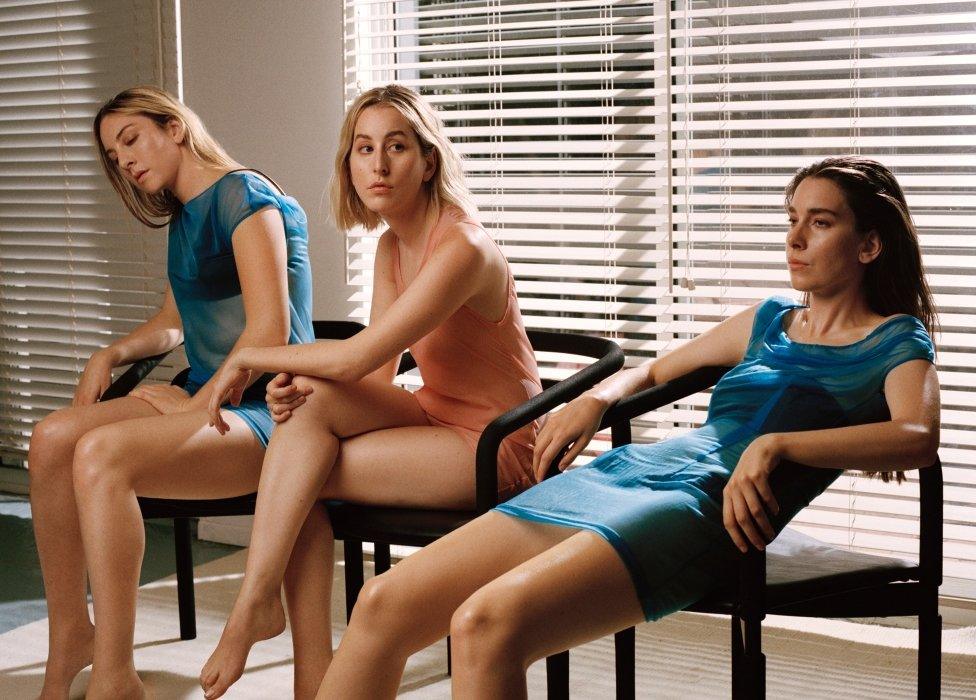
The band topped the BBC's Sound of 2013 list, and have recorded with Charli XCX, Primal Scream and Calvin Harris
Sibling rivalry aside, family has been the foundation of Haim's success.
Their mother, Donna, a teacher-turned-estate agent, taught them guitar; while their father, Mordechai, a former professional footballer in his native Israel, started them on drums.
Together with middle sister Danielle, the girls spent their childhood in a family cover band, Rockinhaim, performing at delis, street fairs and charity gigs around California's San Fernando Valley.
"We played a lot of dorky songs," says Alana. "A lot of Santana."
Even though they ditched their parents to "go solo" in 2006, the sisters continued to write and rehearse in the family living room, fitting early gigs around Este's degree in ethnomusicology and Danielle's side-hustle as a guitarist for Jenny Lewis and Julian Casablancas.
It took the band several years to find their own sound (four early EPs will "never be heard" by the public, says Alana) but, eventually, they worked out how to fuse their sisterly harmonies with the warmth of 70s soft rock and their passion for Britney and the Spice Girls.
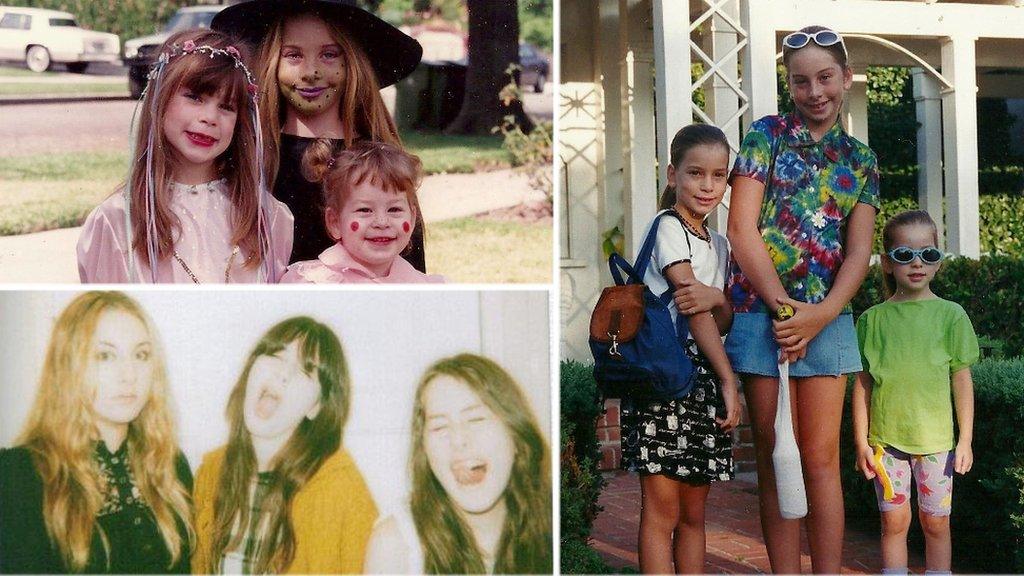
The band were raised in California's San Fernando Valley and played their first show at the local deli, Canter's
In 2013, months after releasing their debut single, Forever, the band topped the BBC's Sound of 2013 list, and went on to top the charts with their first album, Days Are Gone.
Fast forward to 2020 and they're Grammy-nominated festival headliners, poised to release their third album - Women In Music, Pt III.
The title came to Danielle in a dream. "It made me crack up, so I told my sisters," she recalls.
"And I was like, 'Wait a minute, that spells WIMPIII. That's even better!'" laughs Este. "That solidified it."
But there's a serious undertone to the title: Throughout their career, Haim have been dogged by the hackneyed question "What's it like to be women in music?"
Shutting that down was "our evil plan," says Danielle.
"We thought the title was a pretty big wink to the journalists to say, you know, we don't want to be asked about that. And so far, it's worked."
Pay dispute
It's a hard-won attitude from a band who've seen the inequalities of the music industry first-hand.
"Every time we walk into the studio, the engineer is a man," Danielle told the BBC at the 2018 Brits. "There's no equal opportunity."
"We'll go to alternative radio stations in the States and there won't even be a girls' restroom," Este added.
Worse still, they've seen their abilities as musicians dismissed - despite the fact they could play most bands off the stage.
"I feel like because we don't take ourselves too seriously, and we do choreography in our music videos, sometimes the rock community doesn't take us seriously," says Danielle.
"I feel like they want us to be more... I don't know...
"Brooding and aggressive?" suggests Este.
"Yeah, to be more aggressive. It's something we think about a lot: Maybe if we just strictly played our instruments in music videos, not dancing around and stuff, would the rock community take us more seriously as a band?
"And I think unfortunately it does have to do with us being an all-female band. I don't know. Maybe I'm not saying this right, but I can't wrap my head around it."
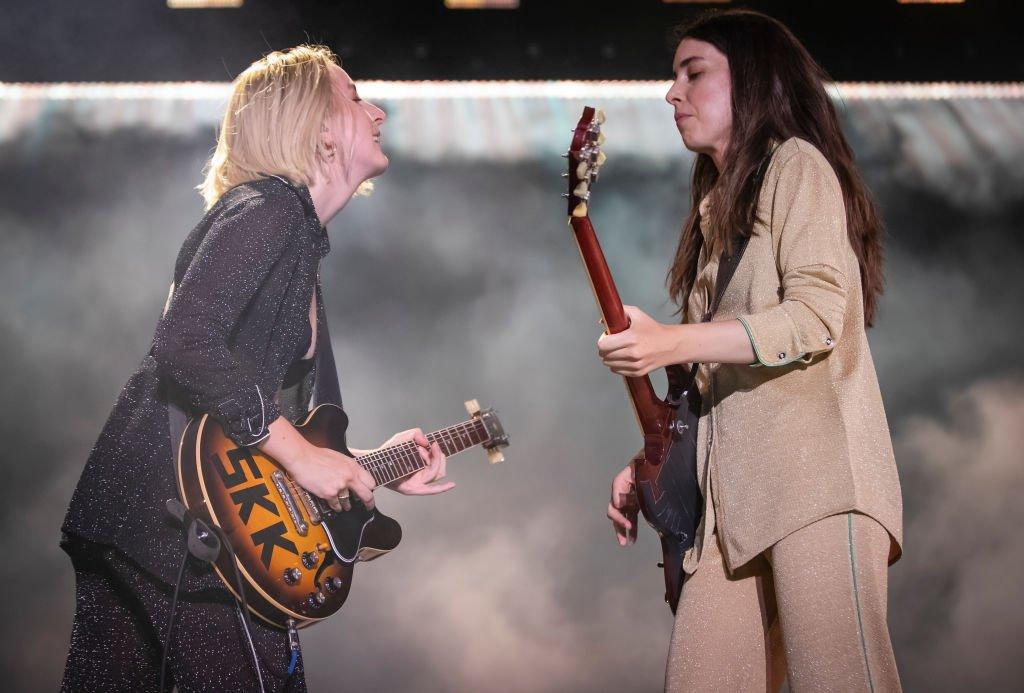
Haim headlined last year's Latitude festival and were due to play Glastonbury this summer before it was cancelled
The situation was thrust into the spotlight in 2017, when Haim discovered they were being paid 10 times less than a male artist playing on the same festival bill, and promptly sacked their booking agent.
"That was messed up," says Este, swearing. "It was like a kick in the stomach."
"You feel like these people should be looking out for you - especially when they know what everyone's getting paid," adds Danielle.
"And yeah, it sucked, but that's the idea with this album: We've gone through a lot of stuff in the last couple of years but now we're like 'Whatever, we'll just do our own thing' We just don't care anymore, you know?"
'Anything goes'
That new confidence came into focus with the release of the album's first single, Summer Girl, last July.
With its elastic bassline and "doot-doot" backing vocals, the track owed such a huge debt to Lou Reed's Walk On The Wild Side that a previous incarnation of the band would have abandoned it.
Instead, they doubled down - adding vintage strings to make the connection even more explicit, giving Reed a writing credit, and rushing the song out in just two weeks.
Allow YouTube content?
This article contains content provided by Google YouTube. We ask for your permission before anything is loaded, as they may be using cookies and other technologies. You may want to read Google’s cookie policy, external and privacy policy, external before accepting. To view this content choose ‘accept and continue’.
"After that, it was like 'Anything goes,'" recalls Danielle. "We were like, 'Let's just record all the songs that we've banked, put it out as soon as we can, keep everything super fresh and not harp on anything for too long'".
Sure enough, when you fire up the album, you'll hear a looseness and spontaneity that was sometimes absent on their earlier records.
The campfire singalong Leaning On You features a guitar line Danielle recorded directly into her laptop, without effects or editing; while 3AM is a kooky-but-funky tribute to late-night hook-ups, complete with squelchy bass burps and "hey girl" voicemails from aspiring Casanovas.
Going back to their roots, The Steps, external has a galloping drum pattern that sounds like it was recorded in their childhood living room.
"We were trying to break down the barrier of sounding like we were in the studio," explains Danielle.
"Before now we've gone for a tighter drum sound - but on this one we wanted it to feel like you're just standing next to us."
The stripped-back immediacy of these new songs capture the band's infectious energy better than ever. But the buoyancy of the music also hides much darker emotions.
Three tracks in particular - I Know Alone, I've Been Down and Now I'm In It - were inspired by a "not leaving the house type of depression" that struck Danielle after the band wrapped up their last tour.
Allow YouTube content?
This article contains content provided by Google YouTube. We ask for your permission before anything is loaded, as they may be using cookies and other technologies. You may want to read Google’s cookie policy, external and privacy policy, external before accepting. To view this content choose ‘accept and continue’.
"It was just a dark time for me in general," says the singer. "I was kind of dealing with myself and my spirals, and the first line I wrote was, 'I know alone like no-one else does.'
"It really struck a chord."
As ever, the 31-year-old could rely on her sisters for support.
"They were like, 'Hey, this is not your normal behaviour. You should get some help,'" she recalls.
"It really kicked me in the ass - and I found a therapist, which has been really, really helpful to me."
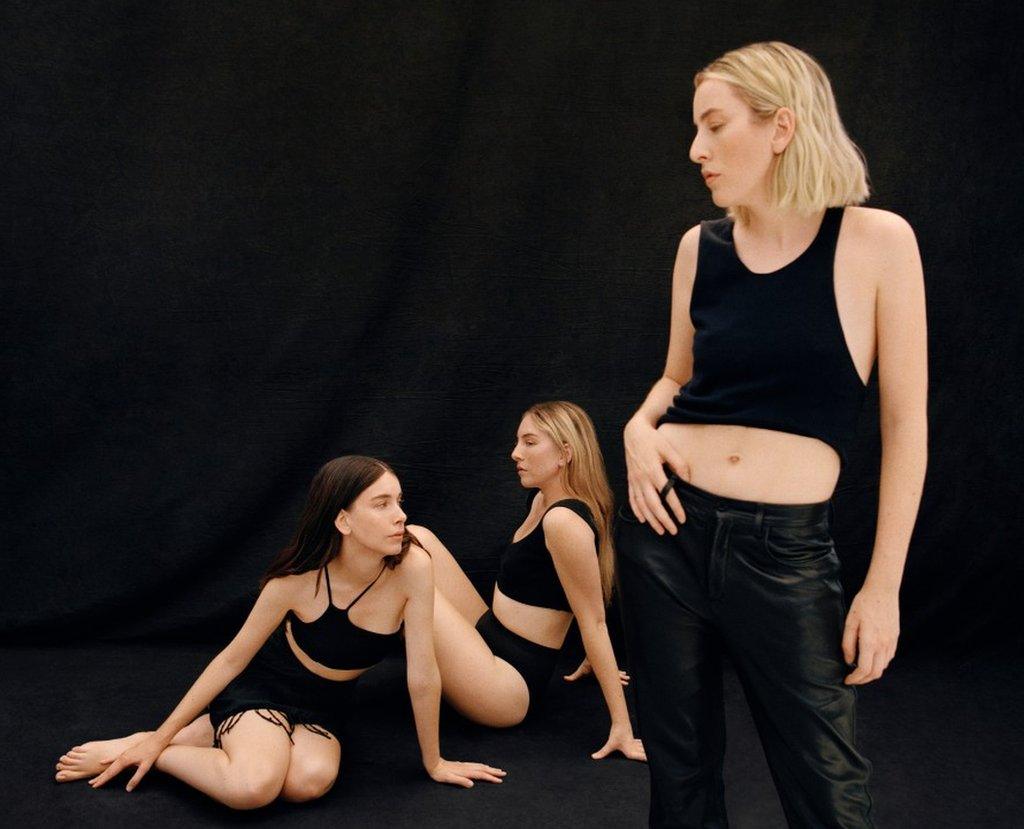
"We're such a close family," says Este
The strength of the sisters' bond eventually inspired the album's most emotional song, Hallelujah.
Este, who has Type 1 diabetes, says she started writing the lyrics after a difficult hospital appointment.
"I came home from the doctor super upset and frustrated and the only two people I felt comfortable enough to talk about it with were Danielle and Alana," she wrote on Twitter, external when the song was released.
"Sometimes it feels like they're the only two people that truly understand me and support me when I feel like giving up."
The loss of that connection has made quarantine particularly gloomy.
"This is the longest the three of us have been separate," confirms Este. "I even bought a back-scratcher because I didn't have anyone to scratch me.
"I felt like Baloo in The Jungle Book, rubbing my back against the posts in my house."
Allow YouTube content?
This article contains content provided by Google YouTube. We ask for your permission before anything is loaded, as they may be using cookies and other technologies. You may want to read Google’s cookie policy, external and privacy policy, external before accepting. To view this content choose ‘accept and continue’.
Since this interview took place at the start of May, Este has managed to escape her apartment - not just for a back rub, but to coach fans in a series of Zoom-based dance classes, external with her sisters (an extremely Haim approach to lockdown album promotion).
But she says the extended period in self-isolation prompted a change in her priorities.
"I'm not going to say 'no' to anything ever again," she declares.
"If someone is like, 'I want to go and climb Mount Wilson,' I'm going to be like, 'You know what, it might take me a couple of days, but let's climb Mount Wilson.'"
"You know what? I might even finally learn how to roller skate," says Alana.
"That might be my first thing out of quarantine. After hugging mom and dad, I'm going to the roller rink."
"Wow, strong idea," Este approves. "It'll be just like my bat mitzvah - just me and my besties roller-skating to The Spice Girls."
Women In Music, Pt. III is out on 26 June.

Follow us on Facebook, external, or on Twitter @BBCNewsEnts, external. If you have a story suggestion email entertainment.news@bbc.co.uk, external.
- Published7 June 2017
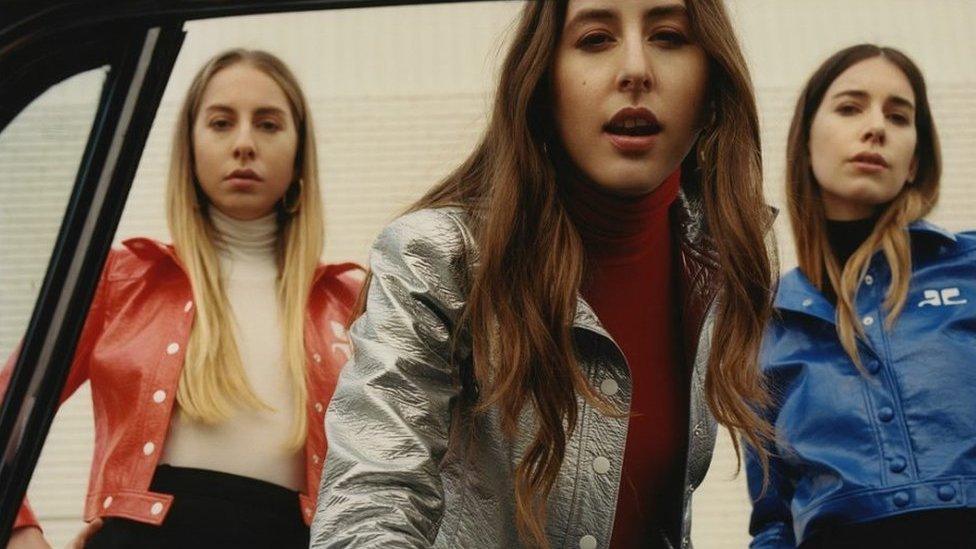
- Published3 January 2014
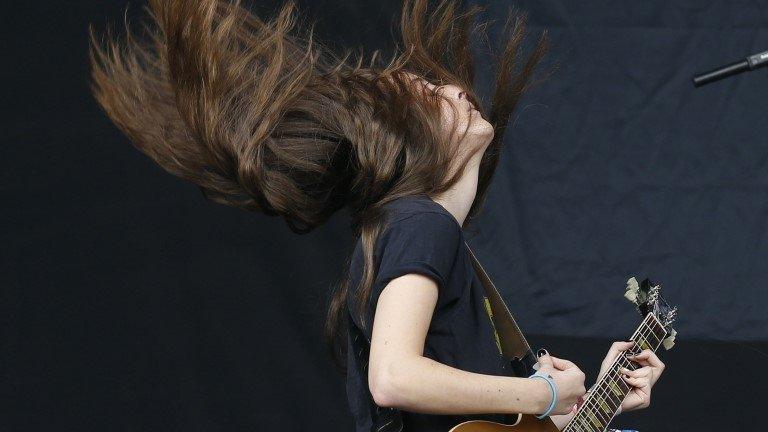
- Published4 January 2013
